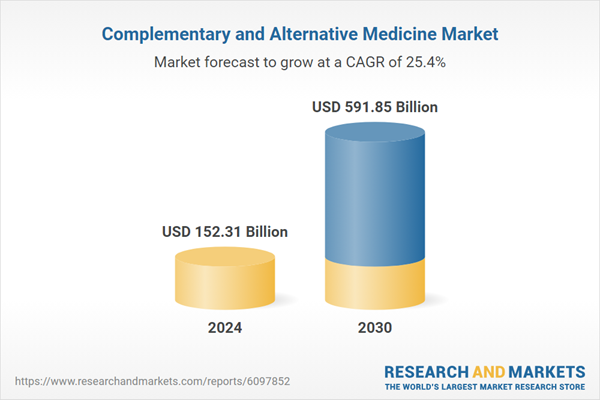Speak directly to the analyst to clarify any post sales queries you may have.
10% Free customizationThis report comes with 10% free customization, enabling you to add data that meets your specific business needs.
Key Market Drivers
Increase in Chronic and Stress-Related Health Conditions
The growing incidence of chronic and stress-induced disorders is a major factor propelling the CAM market. In the U.S., chronic conditions such as heart disease, diabetes, and arthritis affect the majority of adults, with approximately 60% having at least one chronic disease and 40% experiencing two or more, as reported by the CDC in 2023. Additionally, modern lifestyles have intensified stress-related health concerns, with the APA highlighting that nearly three-quarters of Americans face psychological and physical symptoms from stress. These trends are pushing consumers toward alternative therapies like mindfulness, acupuncture, and natural supplements, which are perceived as safer and more holistic solutions for long-term management. CAM interventions are increasingly favored for their ability to address both physical and mental well-being, appealing especially to younger and health-conscious demographics.Key Market Challenges
Lack of Standardized Regulations and Quality Control
A critical challenge hindering the growth of the CAM market is the lack of harmonized regulatory standards and consistent quality control. Unlike conventional pharmaceuticals, many CAM products, particularly herbal and botanical formulations, are subject to disparate regulatory practices across regions. This fragmentation leads to inconsistencies in safety, labeling, and efficacy, which can diminish consumer trust and impede market expansion. Variability in raw material quality and manufacturing processes also contributes to uneven product performance, with risks of contamination, adulteration, or misrepresentation. The absence of universally accepted quality assurance frameworks not only undermines consumer confidence but also complicates commercialization efforts, discouraging large-scale investment and innovation within the sector.Key Market Trends
Integration of CAM into Conventional Healthcare Systems
The integration of CAM therapies into mainstream healthcare is emerging as a key trend shaping the global market. Health institutions and government bodies are increasingly recognizing the value of combining CAM with conventional medicine to deliver comprehensive care. For instance, the U.S. Department of Veterans Affairs has adopted Complementary and Integrative Health approaches to enhance mental health services and pain management for veterans. Government initiatives such as the HHS-backed "Food Is Medicine" strategy also reflect growing institutional support for CAM-based nutritional and wellness interventions. These developments underscore a shift toward multidisciplinary care models that blend clinical science with alternative healing, fostering broader acceptance and institutional adoption of CAM practices.Key Market Players
- Columbia Nutritional, LLC
- Nordic Nutraceuticals A/S
- Ramamani Iyengar Memorial Yoga Institute
- The Healing Company Ltd.
- John Schumacher Unity Woods Yoga Centre
- Sheng Chang Pharmaceutical Company
- Pure Encapsulations, LLC
- Herb Pharm, LLC
- AYUSH Ayurvedic Pte Ltd.
- Gaia Herbs, Inc.
Report Scope
In this report, the Global Complementary and Alternative Medicine Market has been segmented into the following categories, in addition to the industry trends which have also been detailed below:Complementary and Alternative Medicine Market, By Intervention:
- Traditional Alternative Medicine/Botanicals
- Mind Healing
- Body Healing
- External Energy
- Aromatherapy
Complementary and Alternative Medicine Market, By Distribution Method:
- Direct Sales
- E-sales
- Distance Correspondence
Complementary and Alternative Medicine Market, By Region:
- North America
- United States
- Canada
- Mexico
- Europe
- France
- United Kingdom
- Italy
- Germany
- Spain
- Asia-Pacific
- China
- India
- Japan
- Australia
- South Korea
- South America
- Brazil
- Argentina
- Colombia
- Middle East & Africa
- South Africa
- Saudi Arabia
- UAE
Competitive Landscape
Company Profiles: Detailed analysis of the major companies present in the Global Complementary and Alternative Medicine Market.Available Customizations
With the given market data, the publisher offers customizations according to a company's specific needs. The following customization options are available for the report.Company Information
- Detailed analysis and profiling of additional market players (up to five).
This product will be delivered within 1-3 business days.
Table of Contents
Companies Mentioned
- Columbia Nutritional, LLC
- Nordic Nutraceuticals A/S
- Ramamani Iyengar Memorial Yoga Institute
- The Healing Company Ltd.
- John Schumacher Unity Woods Yoga Centre
- Sheng Chang Pharmaceutical Company
- Pure Encapsulations, LLC
- Herb Pharm, LLC
- AYUSH Ayurvedic Pte Ltd.
- Gaia Herbs, Inc.
Table Information
| Report Attribute | Details |
|---|---|
| No. of Pages | 184 |
| Published | June 2025 |
| Forecast Period | 2024 - 2030 |
| Estimated Market Value ( USD | $ 152.31 Billion |
| Forecasted Market Value ( USD | $ 591.85 Billion |
| Compound Annual Growth Rate | 25.3% |
| Regions Covered | Global |
| No. of Companies Mentioned | 10 |









